- Home
- Octavia E. Butler
Bloodchild and Other Stories Page 14
Bloodchild and Other Stories Read online
Page 14
“It is simple. It’s even pleasant once you’re used to it. You will be enfolded by your employer or anyone your employer designates. If both you and the Community enfolding you can communicate, you might be asked to explain or discuss some aspect of our culture that the Community either doesn’t understand or wants to hear more about. Some of them read our literature, our history, even our news. You may be given puzzles to solve. When you’re not enfolded, you may be sent on errands—after you’ve been inside long enough to be able to find your way around. Your employer might sell your contract to another Community, might even send you to one of the other bubbles. They’ve agreed not to send you out of the country, and they’ve agreed that when your contract is up, they’ll let you leave by way of the Mojave Bubble—since this is where you’ll begin. You won’t be injured. There’ll be no bio-medical experiments, none of the nastier social experiments that captives endured. You’ll receive all the food, water, and shelter that you need to keep you healthy. If you get sick or injured, you have the right to see a human physician. I believe there are two human doctors working here at Mojave now.” She paused and James Adio spoke up.
“So what will we be, then?” he demanded. “Whores or house pets?”
Thera Collier made a noise that was almost a sob.
Noah smiled humorlessly. “We’re neither, of course. But you’ll probably feel as though you’re both unless you learn the language. We are one interesting and unexpected thing, though.” She paused. “We’re an addictive drug.” She watched the group and recognized that Rune Johnsen had already known this. And Sorrel Trent had known. The other four were offended and uncertain and shocked.
“This effect proves that humanity and the Communities belong together,” Sorrel Trent said. “We’re fated to be together. They have so much to teach us.”
Everyone ignored her.
“You told us they understood that we were intelligent,” Michelle Ota said.
“Of course they understand,” Noah said. “But what’s important to them is not what they think of our intellect. It’s what use we can be to them. That’s what they pay us for.”
“We’re not prostitutes!” Piedad Ruiz said. “We’re not! There’s no sex in any of this. There can’t be. And there are no drugs either. You said so yourself!”
Noah turned to look at her. Piedad didn’t listen particularly well, and she lived in terror of prostitution, drug addiction, disease, anything that might harm her or steal her ability to have the family she hoped for. Her two older sisters were already selling themselves on the streets. She hoped to rescue them and herself by getting work with the Communities.
“No sex,” Noah agreed. “And we are the drugs. The Communities feel better when they enfold us. We feel better too. I guess that’s only fair. The ones among them who are having trouble adjusting to this world are calmed and much improved if they can enfold one of us now and then.” She thought for a moment. “I’ve heard that for human beings, petting a cat lowers our blood pressure. For them, enfolding one of us calms them and eases what translates as a kind of intense biological homesickness.”
“We ought to sell them some cats,” Thera said. “Neutered cats so they’ll have to keep buying them.”
“Cats and dogs don’t like them,” Noah said. “As a matter of fact, cats and dogs won’t like you after you’ve lived in the bubble for a while. They seem to smell something on you that we can’t detect. They panic if you go near them. They bite and scratch if you try to handle them. The effect lasts for a month or two. I generally avoid house pets and even farm animals for a couple of months when I go out.”
“Is being enveloped anything like being crawled over by insects?” Piedad asked. “I can’t stand having things crawl on me.”
“It isn’t like any experience you’ve ever had,” Noah said. “I can only tell you that it doesn’t hurt and it isn’t slimy or disgusting in any way. The only problem likely to be triggered by it is claustrophobia. If any of you had been found to be claustrophobic, you would have been culled by now. For the non-claustrophobic, well, we’re lucky they need us. It means jobs for a lot of people who wouldn’t otherwise have them.”
“We’re the drug of choice, then?” Rune said. And he smiled.
Noah smiled back. “We are. And they have no history of drug taking, no resistance to it, and apparently no moral problems with it. All of a sudden they’re hooked. On us.”
James Adio said, “Is this some kind of payback for you, Translator? You hook them on us because of what they did to you.”
Noah shook her head. “No payback. Just what I said earlier. Jobs. We get to live, and so do they. I don’t need payback.”
He gave her a long, solemn look. “I would,” he said. “I do. I can’t have it, but I want it. They invaded us. They took over.”
“God, yes,” Noah said. “They’ve taken over big chunks of the Sahara, the Atacama, the Kalahari the Mojave and just about every other hot, dry wasteland they could find. As far as territory goes, they’ve taken almost nothing that we need.”
“They’ve still got no right to it,” Thera said. “It’s ours, not theirs.”
“They can’t leave,” Noah said.
Thera nodded. “Maybe not. But they can die!”
Noah ignored this. “Some day maybe a thousand of years from now, some of them will leave. They’ll build and use ships that are part multigenerational and part sleeper. A few Communities stay awake and keep things running. Everyone else sort of hibernates.” This was a vast oversimplification of the aliens’ travel habits, but it was essentially true. “Some of us might even wind up going with them. It would be one way for the human species to get to the stars.”
Sorrel Trent said wistfully, “If we honor them, maybe they will take us to heaven with them.”
Noah suppressed an urge to hit the woman. To the others, she said, “The next two years will be as easy or as difficult as you decide to make them. Keep in mind that once the contract is signed, the Communities won’t let you go because you’re angry with them or because you hate them or even because you try to kill them. And by the way, although I’m sure they can be killed, that’s only because I believe anything that’s alive can die. I’ve never seen a dead Community, though. I’ve seen a couple of them have what you might call internal revolution. The entities of those Communities scattered to join other Communities. I’m not sure whether that was death, reproduction, or both.” She took a deep breath and let it out. “Even those of us who can talk fluently with the Communities don’t understand their physiology that well.”
“Finally, I want to tell you a bit of history. When I’ve done that, I’ll I escort you in and introduce you to your employers.”
“Are we all accepted, then?” Rune Johnsen asked.
“Probably not,” Noah said. “There’s a final test. When you go in, you will be enfolded, each of you, by a potential employer. When that’s over, some of you will be offered a contract and the rest will be given the thanks-for-stopping-by fee that anyone who gets this far and no farther is given.”
“I had no idea the … enfolding … would happen so soon,” Rune Johnsen said. “Any pointers?”
“About being enfolded?” Noah shook her head. “None. It’s a good test. It lets you know whether you can stand the Communities and lets them know whether they really want you.”
Piedad Ruiz said, “You were going to tell us something—something from history.”
“Yes.” Noah leaned back in her chair. “It isn’t common knowledge. I looked for references to it while I was in school, but I never found any. Only my military captors and the aliens seemed to know about it. The aliens told me before they let me go. My military captors gave me absolute hell for knowing.
“It seems that there was a coordinated nuclear strike at the aliens when it was clear where they were establishing their colonies. The armed forces of several countries had tried and failed to knock them out of the sky before they landed. Everyone knows that. B
ut once the Communities established their bubbles, they tried again. I was already a captive inside the Mojave bubble when the attack came. I have no idea how that attack was repelled, but I do know this, and my military captors confirmed it with their lines of questioning: the missiles fired at the bubbles never detonated. They should have, but they didn’t. And sometime later, exactly half of the missiles that had been fired were returned. They were discovered armed and intact, scattered around Washington DC in the White House—one in the Oval Office—in the capitol, in the Pentagon. In China, half of the missiles fired at the Gobi Bubbles were found scattered around Beijing. London and Paris got one half of their missiles back from the Sahara and Australia. There was panic, confusion, fury. After that, though, the “invaders,” the “alien weeds” began to become in many languages, our “guests,” our “neighbors,” and even our “friends.”
“Half the nuclear missiles were … returned?” Piedad Ruiz whispered.
Noah nodded. “Half, yes.”
“What happened to the other half?”
“Apparently, the Communities still have the other half—along with whatever weapons they brought with them and any they’ve built since they’ve been here.”
Silence. The six looked at one another, then at Noah.
“It was a short, quiet war,” Noah said. “We lost.”
Thera Collier stared at her bleakly. “But … but there must be something we can do, some way to fight.”
Noah stood up, pushed her comfortable chair away. “I don’t think so,” she said. “Your employers are waiting. “Shall we join them?”
Afterword
“Amnesty” was inspired by the things that happened to DoctorWen Ho Lee of Los Alamos—back in the 1990s when I could still be shocked that a person could have his profession and his freedom taken away and his reputation damaged all without proof that he’d actually done anything wrong. I had no idea how commonplace this kind of thing could become.
The Book of Martha
“It’s difficult, isn’t it?” God said with a weary smile. “You’re truly free for the first time. What could be more difficult than that?”
Martha Bes looked around at the endless grayness that was, along with God, all that she could see. In fear and confusion, she covered her broad black face with her hands. “If only I could wake up,” she whispered.
God kept silent but was so palpably, disturbingly present that even in the silence Martha felt rebuked. “Where is this?” she asked, not really wanting to know, not wanting to be dead when she was only forty-three. “Where am I?”
“Here with me,” God said.
“Really here?” she asked. “Not at home in bed dreaming? Not locked up in a mental institution? Not … not lying dead in a morgue?”
“Here,” God said softly. “With me.”
After a moment, Martha was able to take her hands from her face and look again at the grayness around her and at God. “This can’t be heaven,” she said. “There’s nothing here, no one here but you.”
“Is that all you see?” God asked.
This confused her even more. “Don’t you know what I see?” she demanded and then quickly softened her voice. “Don’t you know everything?”
God smiled. “No, I outgrew that trick long ago. You can’t imagine how boring it was.”
This struck Martha as such a human thing to say that her fear diminished a little—although she was still impossibly confused. She had, she remembered, been sitting at her computer, wrapping up one more day’s work on her fifth novel. The writing had been going well for a change, and she’d been enjoying it. For hours, she’d been spilling her new story onto paper in that sweet frenzy of creation that she lived for. Finally, she had stopped, turned the computer off, and realized that she felt stiff. Her back hurt. She was hungry and thirsty, and it was almost five A.M. She had worked through the night. Amused in spite of her various aches and pains, she got up and went to the kitchen to find something to eat.
And then she was here, confused and scared. The comfort of her small, disorderly house was gone, and she was standing before this amazing figure who had convinced her at once that he was God—or someone so powerful that he might as well be God. He had work for her to do, he said—work that would mean a great deal to her and to the rest of humankind.
If she had been a little less frightened, she might have laughed. Beyond comic books and bad movies, who said things like that?
“Why,” she dared to ask, “do you look like a twice-live-sized, bearded white man?” In fact, seated as he was on his huge thronelike chair, he looked, she thought, like a living version of Michelangelo’s Moses, a sculpture that she remembered seeing pictured in her college art-history textbook about twenty years before. Except that God was more fully dressed than Michelangelo’s Moses, wearing, from neck to ankles, the kind of long, white robe that she had so often seen in paintings of Christ.
“You see what your life has prepared you to see,” God said.
“I want to see what’s really here!”
“Do you? What you see is up to you, Martha. Everything is up to you.”
She sighed. “Do you mind if I sit down?”
And she was sitting. She did not sit down, but simply found herself sitting in a comfortable armchair that had surely not been there a moment before. Another trick, she thought resentfully—like the grayness, like the giant on his throne, like her own sudden appearance here. Everything was just one more effort to amaze and frighten her. And, of course, it was working. She was amazed and badly frightened. Worse, she disliked the giant for manipulating her, and this frightened her even more. Surely he could read her mind. Surely he would punish …
She made herself speak through her fear. “You said you had work for me.” She paused, licked her lips, tried to steady her voice. “What do you want me to do?”
He didn’t answer at once. He looked at her with what she read as amusement—looked at her long enough to make her even more uncomfortable.
“What do you want me to do?” she repeated, her voice stronger this time.
“I have a great deal of work for you,” he said at last. “As I tell you about it, I want you to keep three people in mind: Jonah, Job, and Noah. Remember them. Be guided by their stories.”
“All right,” she said because he had stopped speaking, and it seemed that she should say something. “All right.”
When she was a girl, she had gone to church and to Sunday School, to Bible class and to vacation Bible school. Her mother, only a girl herself, hadn’t known much about being a mother, but she had wanted her child to be “good,” and to her, “good” meant “religious.” As a result, Martha knew very well what the Bible said about Jonah, Job, and Noah. She had come to regard their stories as parables rather than literal truths, but she remembered them. God had ordered Jonah to go to the city of Nineveh and to tell the people there to mend their ways. Frightened, Jonah had tried to run away from the work and from God, but God had caused him to be shipwrecked, swallowed by a great fish, and given to know that he could not escape.
Job had been the tormented pawn who lost his property, his children, and his health, in a bet between God and Satan. And when Job proved faithful in spite of all that God had permitted Satan to do to him, God rewarded Job with even greater wealth, new children, and restored health.
As for Noah, of course, God ordered him to build an ark and save his family and a lot of animals because God had decided to flood the world and kill everyone and everything else.
Why was she to remember these three Biblical figures in particular? What had they do with her—especially Job and all his agony?
“This is what you’re to do,” God said. “You will help humankind to survive its greedy, murderous, wasteful adolescence. Help it to find less destructive, more peaceful, sustainable ways to live.”
Martha stared at him. After a while, she said feebly, “… what?”
“If you don’t help them, they will be destroyed.”
/>
“You’re going to destroy them … again?” she whispered.
“Of course not,” God said, sounding annoyed. “They’re well on the way to destroying billions of themselves by greatly changing the ability of the earth to sustain them. That’s why they need help. That’s why you will help them.”
“How?” she asked. She shook her head. “What can I do?”
“Don’t worry,” God said. “I won’t be sending you back home with another message that people can ignore or twist to suit themselves. It’s too late for that kind of thing anyway.” God shifted on his throne and looked at her with his head cocked to one side. “You’ll borrow some of my power,” he said. “You’ll arrange it so that people treat one another better and treat their environment more sensibly. You’ll give them a better chance to survive than they’ve given themselves. I’ll lend you the power, and you’ll do this.” He paused, but this time she could think of nothing to say. After a while, he went on.
“When you’ve finished your work, you’ll go back and live among them again as one of their lowliest. You’re the one who will decide what that will mean, but whatever you decide is to be the bottom level of society, the lowest class or caste or race, that’s what you’ll be.”
This time when he stopped talking, Martha laughed. She felt overwhelmed with questions, fears, and bitter laughter, but it was the laughter that broke free. She needed to laugh. It gave her strength somehow.
“I was born on the bottom level of society,” she said. “You must have known that.”
God did not answer.
“Sure you did.” Martha stopped laughing and managed, somehow, not to cry. She stood up, stepped toward God. “How could you not know? I was born poor, black, and female to a fourteen-year-old mother who could barely read. We were homeless half the time while I was growing up. Is that bottom-level enough for you? I was born on the bottom, but I didn’t stay there. I didn’t leave my mother there, either. And I’m not going back there!”

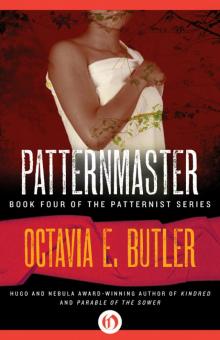 Patternmaster
Patternmaster Survivor
Survivor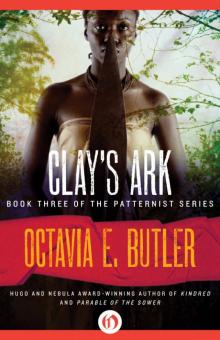 Clay's Ark
Clay's Ark Bloodchild and Other Stories
Bloodchild and Other Stories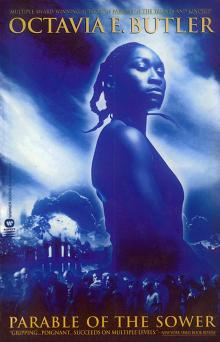 Parable of the Sower
Parable of the Sower Wild Seed
Wild Seed Fledgling
Fledgling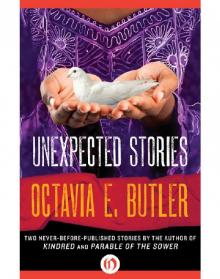 Unexpected Stories
Unexpected Stories Kindred
Kindred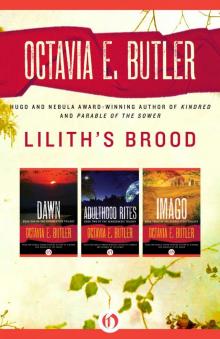 Lilith's Brood: Dawn / Adulthood Rites / Imago
Lilith's Brood: Dawn / Adulthood Rites / Imago Adulthood Rites
Adulthood Rites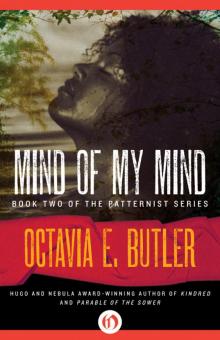 Mind of My Mind
Mind of My Mind Seed to Harvest
Seed to Harvest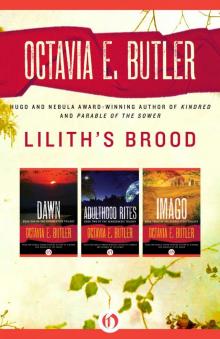 Lilith's Brood: Dawn, Adulthood Rites, and Imago (Xenogenesis Trilogy)
Lilith's Brood: Dawn, Adulthood Rites, and Imago (Xenogenesis Trilogy)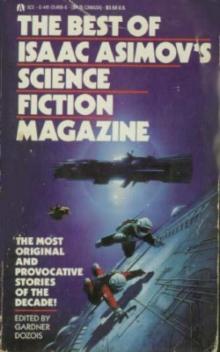 Bloodchild
Bloodchild Seed to Harvest: Wild Seed, Mind of My Mind, Clay's Ark, and Patternmaster (Patternist)
Seed to Harvest: Wild Seed, Mind of My Mind, Clay's Ark, and Patternmaster (Patternist)